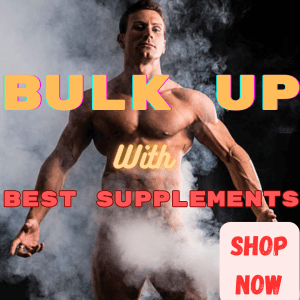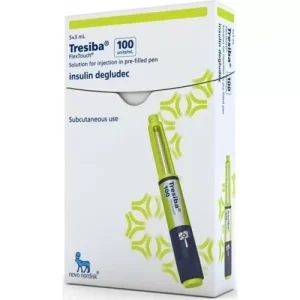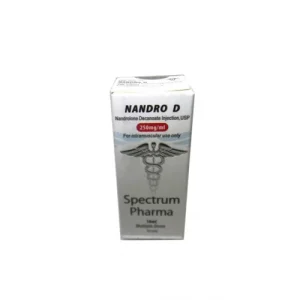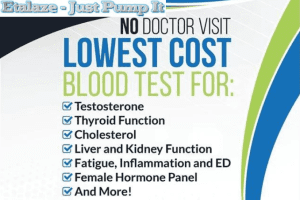Steroids
Covid-19: Advices to Steroid Users

If you think visiting the gym during the Covid period is a breeze, think again. Not now, not before a lasting solution for the virus is found. Covid-19 continues to wreak havoc worldwide. People no longer have the luxury of working out in groups or visiting public gyms. Like everyone else, Steroid users are not sure of the relationship between the virus and the drugs they take. Luckily for people already using steroids, you may have found a solution. Instead, your body may be able to fight the virus thanks to particular strains of corticosteroids. Medical experts are leaving no stone unturned in their quest to find solutions for Covid-19. That means exploring a range of treatment options, including possible treatment with systemic corticosteroids.
Steroids help people treat a range of conditions, specifically to manage pain and inflammation. However, most of the steroids used today are for bodybuilding, fitness, and performance enhancement.
Corticosteroids and Covid-19 Management: Dexamethasone
The World Health Organization has researched several types of steroids' effectiveness in managing Covid-19. The findings are inconclusive, but there is hope that steroids could help manage the virus better than traditional medicine. The most significant advantage of using corticosteroids for Covid treatment is that they have fewer side effects than regular clinical medication.
Methandienone by Magnus >> Buy It <<
In a July 17, 2020 research, the WHO evaluated corticosteroids versus ordinary Covid care for patients. Mortality data was made available by subgroup, i.e., severe and non-severe Covid cases. The drug was administered to both groups of patients, and we can say that the future is bright for steroids as a possible treatment option for Covid-19. One particular steroid caught the medical world's attention in this regard – Dexamethasone.
Dexamethasone
A popular steroid used to manage arthritis funds to help save the lives of critically ill people with the virus. Preliminary findings show that Dexamethasone could save ICU patients' lives by a third and those under oxygen only by a fifth. Dexamethasone is usually used to reduce pain and inflammation caused by autoimmune conditions and has been on the WHO's watch list to treat various conditions since the 1960s. However, patients not critically ill with the virus didn't receive significant benefits from using the drug.
The best thing about Dexamethasone in Covid treatment is that you don't have to sweat to find it. It is both accessible and affordable to people who would otherwise not access regular Covid-19 medication. Also, use Dexamethasone alongside other Covid-19 treatment options without exposing the patient to adverse reactions.
Although Dexamethasone is now widely used for this purpose, the WHO has not yet released final findings alongside clinical guidance on drug use. Once this is one, we will better understand this revolutionary intervention in managing the virus.
Related Article:: Steroid Acne in Men: Causes, Treatment, and Prevention
What Are Bodybuilders Afraid of?
Besides the fear of the virus, bodybuilders and fitness professionals are afraid of many other things related to Covid-19. Believe it or not, bodybuilders are now suffering from panic attacks caused by a virus that is billions of times smaller than them. And they are justified to fear it. It is difficult to fight an invisible enemy, which shifts the battleground to unfamiliar territory. Yes, unfamiliar territory, despite it being your own body. Here are a few things about the virus causing sleepless nights for bodybuilders.
Long-Term Effects
Covid-19 is feared not because it has a high mortality rate. It can be considered less dangerous than more than a dozen other diseases. What makes this particular virus dreadful is how it attacks the body. It comes in intensive waves that overwhelm people with relatively weak immune systems. Additionally, the virus has long-term effects that could accompany someone for a long. There have been reports that the virus leaves one's lungs working below the average capacity even after recovery.
That is particularly scary for people interested in fitness and bodybuilding because their lungs are the engine that drives them. For one to withstand long intensive workouts, their lungs must function exceptionally well. Covid threatens to take away this fundamental aspect of your hobby or career. It is probably why bodybuilders are more afraid of the disease than the rest of the population.
Must Read: 5 Fitness Tips While Gyms Are Closed
The High Probability of Catching It Outdoors
Bodybuilding and fitness is some contact sport involving working close to people. Additionally, there are many items, equipment, and surfaces bodybuilders share. That makes it risky to continue your routine as a bodybuilder or fitness person.
However, bodybuilders don't have a choice about where to work out in the current situation. Once you are locked in or your movement is restricted, the chances are that you may not end up visiting your usual workout spots. It may seem uncomfortable, but it is for the best. There is no point in catching the virus when you can transform your house and backyard into a gym. It may not be a world-class gym, but it will serve its purpose for the time being.
The Challenges of Working Indoors
For bodybuilders who are not used to working out at home, this period is most challenging for their lives and careers. Before the virus came, every bodybuilder had a plan and expectations tied to it. For most of them, working in groups or pairs achieves double the results compared to working independently. Everybody is now locked in their house to try and maintain normalcy in an abnormal world. It may take longer to adjust to the new normal, but there are a few options.
Best Fitness Products for 2020
Several bodybuilders have reported being unable to maintain bulk while working at home. Twin bodybuilder brothers Brian and Daniel Zhou have indicated that home workouts do not help them achieve the desired results in maintaining bulk. Sticking to their routine has been particularly difficult, partly because every other piece of equipment they use is now not within their reach. Daniel went as far as buying a pull-up bar to help him with back exercises. Still, that didn't seem to help him achieve the desired results. So he had to fill his backpack with water bottles to try and make it more intensive. The twins have been coming up with innovations here and there to ensure they are not disrespecting their routines.
Related Article:: 5 Home Gym Essentials To Build A Great Body
Every bodybuilder out there is going through a challenge that comes with deviating from their routine. Although some have successfully returned to their careers on track, many are still struggling to stay afloat. Some of them will have lost form and focus in the long run, which is a terrifying thought for every bodybuilder and fitness person.
Lack of Competition
Although bodybuilders can monitor their bodybuilding progress and determine if their form is improving, stagnating, or deteriorating, they need competition. Competition helps keep a bodybuilder on their toes regarding training and dieting. Some of them might become complacent and lose form without competition and contests. Most bodybuilders are scared of that happening and are trying their best to compete with themselves until the pandemic is overcome.
The community at the gym does a lot for the bodybuilder. A gym is more than just a place to lift weights. You need people around to boost your morale. Most importantly, it would help if you had more experience than you to point directions for you. That means evoking a gym at home is no small task for any bodybuilder.
Dieting is A Problem
With the pandemic's onset and persistence, most bodybuilders are increasingly finding it difficult to stick to their dieting programs. The Covid crisis has affected virtually every aspect of the economy. Bodybuilders are now finding it hard to get their superfoods and other supplements. The lack of critical bodybuilding stuff threatens a bodybuilder's form.
Must Read:: The Correct Diet Plan That Complements Your Bodybuilding Cycle!
Guidelines for Steroid Use During the Covid Period
While the coronavirus pandemic has affected how one does their bodybuilding and fitness workouts, but not your steroid intake, steroid users are in three groups; those infected, recovering, or uninfected. So, what should you or not do about steroids in either group? We have prepared a few guidelines for you.
Don't stop taking your steroid tablets.
Suppose you happen to contract covid-19. If you are in home-based care, you should let your doctor know you are taking steroids before they start prescribing other drugs. Getting all the information you need about taking steroids alongside regular medication in the hospital is a bit easy. However, remember that this is a relatively new virus that not even medics know much about. Everything ongoing right now concerning treatment is merely experimentation. What we are sure about is that most modern medications have not been entirely successful n managing it. In any case, we often talk about managing the condition rather than managing it. You never know; maybe the steroids you use could be the ultimate Covid-19 treatment.
Covid-19 Complications
Covid-19 is continually causing new complications as the strains of the virus increase. That means you may not know if you are suffering from covid-19. If you develop conditions that warrant you to use steroids, such as joint pains and inflammation, don't be quick to use them. Instead, consult your rheumatology team or doctor first. Get checked by a doctor to know what you are ailing from. In the unfortunate event that you turn out to be Covid-19 positive, the doctor will decide whether you should include corticosteroids in your treatment or not. You can suggest using approved corticosteroids such as Dexamethasone for your treatment, but it will be for them to decide. If your condition is unclear, the doctor can give you a steroid injection as a last resort option. While doing so, they should give you the lowest possible dose to avoid aggravating the condition further.
How to take Steroids during Covid-19?
Always take steroids and other Covid management drugs interchangeably. If you stopped taking steroids more than a month before contracting Covid-19, you don't need to use them now unless your doctor suggests it. You only use them alongside the other drugs provided if you tested positive while still using them or within less than a month of stopping their use. That precaution is essential because you never know which Covid-19 management drugs cause an adverse reaction when combined with steroids. Most importantly, ensure the steroid dosage is always the lowest possible.
Related Article:: Steroids during the lock downside effects with no real workout.
Immunosuppressant drugs and steroids
Take plenty of immunosuppressant drugs and steroids l because you may need to reduce your immune system in the face of incurable viral diseases. Suppressing your immune system is the best chance you have against diseases like Covid-19, especially if you're a steroid person. The reason is that the drugs treat and prevent the virus's hyper-inflammatory phase, which usually becomes fatal after a short time. Although these drugs may prove harmful when they reduce your response to the virus, it is still a viable option, given that the virus can even kill hours after contracting it.
Conclusion
Steroids have received negative coverage by the media because of their perceived harmful effects on users. However, scientists have debunked most of the myths associated with steroids. There haven't been any reports about the negative effect of steroids on people suffering from Covid-19. Instead, the drugs have been found to treat viral diseases like the case of Dexamethasone. The only you should be careful about is balancing between corticosteroids and other Covid drugs.
Additionally, you may have to make changes to your steroid intake, like the dosage and frequency of use, to avoid jamming your system with too much of it. Otherwise, you are free to continue using your steroids if you contract the virus, not only to get the usual benefits but also to treat the virus as well possibly. Until the pandemic is contained, be safe and keep practicing. We want to see your best form when you finally come out.
Anabolic Steroids
Joint Stiffness: How to Manage It While on AAS
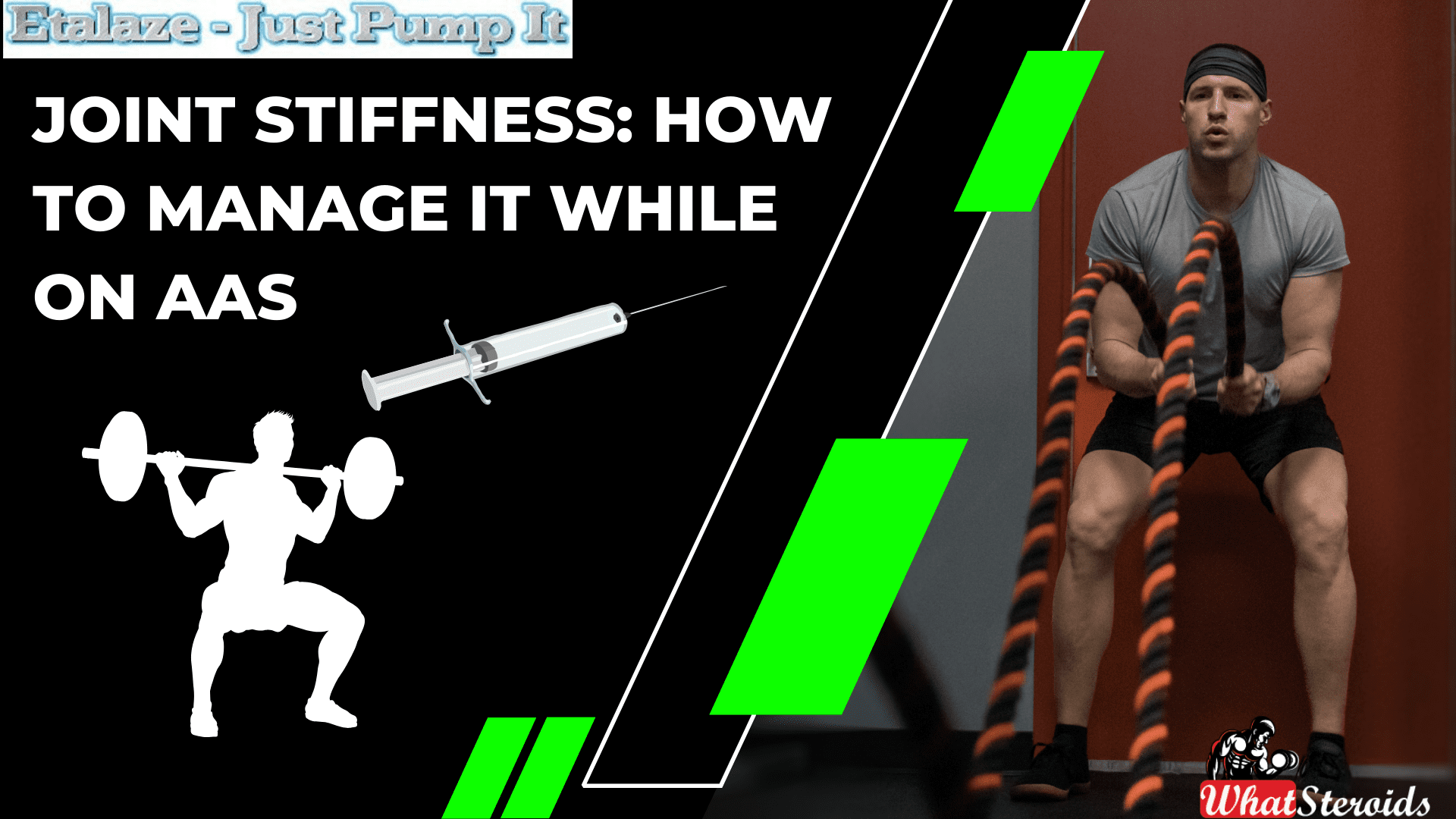
Joint stiffness is a common issue among bodybuilders who use androgenic anabolic steroids (AAS). Here's how it happens and what it involves:
AAS Mechanism of Action
Anabolic-androgenic steroids (AAS) work by enhancing muscle growth and strength. They enlarge muscle cells through hypertrophy, leading to increased muscle mass.
Activation of Androgen Receptors (AR)
-
- AAS, including those produced naturally (such as testosterone and dihydrotestosterone), bind to and activate the androgen receptor (AR).
- The AR is present in various tissues throughout the body.
Androgenic and Anabolic Effects
AAS effects can be categorized into:
Androgenic: These relate to the development and maintenance of male sexual characteristics.
Anabolic: These involve increasing bone density, muscle mass, and strength.
Impairment of Testosterone Biosynthesis
-
- In supraphysiological doses, AAS can impair testosterone biosynthesis in tissues.
- This disruption occurs due to their interaction with AR signaling.
How AAS Contribute to Joint Stiffness
Water Retention and Electrolyte Imbalance
-
- AAS can cause water retention, leading to increased fluid in the joint spaces. While this might initially seem beneficial, it can lead to stiffness if the excess fluid disrupts normal joint function.
- Electrolyte imbalances caused by AAS can affect muscle and joint function, contributing to stiffness.
Changes in Collagen Synthesis
-
- AAS can affect the synthesis and degradation of collagen, a primary component of connective tissue. This can lead to a decrease in the elasticity and resilience of tendons and ligaments, making joints feel stiffer.
Increased Muscle Mass
-
- Rapid gains in muscle mass can place additional stress on joints, which may not have time to adapt, resulting in stiffness and discomfort.
Altered Pain Perception
-
- Some AAS can alter pain perception and inflammatory responses, potentially masking injuries or causing changes in how the body responds to minor joint stresses, leading to stiffness.
Which Specific AAS Mainly Cause Joint Stiffness?
While not all anabolic-androgenic steroids (AAS) exhibit these adverse effects, certain ones are more prone to causing them. These include:
- Winstrol
- Masteron
- Proviron
- Halotestin
- Trenbolone
Additionally, high doses of testosterone, Dianabol, and Trestolone may also carry similar risks.
Dealing With Joint Stiffness Caused By AAS
Most AAS are dry compounds known for causing joint dryness. Some are usually wet compounds, which can lead to joint problems when taken in high doses without an aromatase inhibitor (AI), resulting in excess water retention that affects the joints.
Other AAS either have a neutral impact on the joints or enhance their strength and healing by boosting collagen production, with Nandrolone being a prime example.
To prevent joint issues when using wet AAS compounds, it is essential to use the appropriate AI dose (not too high) to manage estradiol levels and prevent excessive water retention.
Must Read: Anavar Cycle for Men and Women
For dry compounds, follow these guidelines to avoid joint issues:
Selective Testosterone Use
Ensure the use of a Testosterone base to achieve adequate estradiol conversion. While excess estradiol can cause water retention and joint damage, having the right amount is crucial for joint strength and lubrication.
Proper Gym Training
Exercise caution in the gym. Continuously pursuing personal records and lifting the heaviest weights can damage joints and cause injuries. Proper stretching and warming up with lighter weights are vital.
Supplements
Supplement with joint health supplements. Fish Oil at 6g daily or Krill Oil at 3g daily is essential for every AAS user. Additionally, taking MSM (Methylsulfonylmethane) at 1g daily and a few tablespoons of Collagen Powder daily will significantly benefit joint health.
Managing Other Forms of Joint Stiffness
Proper Warm-Up and Cool-Down
Engaging in thorough warm-up routines before workouts and adequate cool-down exercises afterward can help maintain joint flexibility.
Hydration and Nutrition
Staying well-hydrated and maintaining a balanced diet rich in essential nutrients like omega-3 fatty acids, glucosamine, and chondroitin can support joint health.
Supplementation
Using joint support supplements such as glucosamine, chondroitin, and MSM (methylsulfonylmethane) may help alleviate stiffness.
Monitoring and Adjusting Steroid Use
Careful monitoring of AAS dosages and cycles, under the guidance of a healthcare professional, can help minimize negative effects on joint health.
Rest and Recovery
Ensuring adequate rest and incorporating rest days into training routines can help prevent overuse injuries and joint stiffness.
Physical Therapy
Engaging in physical therapy or specific joint mobility exercises can improve joint function and reduce stiffness.
Long-Term Considerations
It's important to be aware that chronic use of AAS can lead to long-term joint issues. Regular check-ups with a healthcare provider, including monitoring of joint health, are crucial for those using AAS over extended periods. Recognizing the signs of joint problems early and taking proactive measures can help mitigate the risk of long-term damage.
Where to Buy AAS Online
Buying legitimate androgenic anabolic steroids (AAS) online can be challenging and carries significant legal, health, and ethical risks. However, if someone decides to proceed, here are some general tips on where to buy and how to check the quality:
Licensed Pharmacies (Where Legal)
In some countries, AAS can be purchased legally with a prescription from licensed pharmacies. Ensure to follow local regulations and obtain a valid prescription.
Reputable Online Retailers
Look for well-known, established online retailers with positive reviews and verified customer feedback. Forums, bodybuilding communities, and social media can provide recommendations.
Research Chemical Companies
Some companies sell research chemicals, including AAS, for "research purposes." Ensure these companies have good reputations and offer transparency about their products.
How to Check Good Quality
Third-Party Lab Testing
The best way to verify the quality of AAS is through third-party lab testing. Reputable sellers often provide lab reports or certificates of analysis that verify the purity and potency of their products.
Reviews and Testimonials
Check reviews on bodybuilding forums, websites, and social media platforms. Look for consistent positive feedback about product effectiveness, safety, and customer service.
Batch Numbers and Serialization
Legitimate products usually have batch numbers, expiration dates, and sometimes serialization. You can often verify these details through the manufacturer's website.
Packaging and Labels
Examine the packaging and labels for professionalism and accuracy. Poorly printed labels, misspellings, and low-quality packaging are red flags.
Customer Service
Good suppliers will have responsive and knowledgeable customer service. Ask questions about their products, sourcing, and testing procedures to gauge their reliability.
Price Comparison
If the price seems too good to be true, it probably is. Compare prices with other reputable sources to ensure you're not buying counterfeit or low-quality products.
Related Article: Varicose Veins in Bodybuilders: Risk Factors, Diagnosis and Management
Warning and Legal Considerations
- Legality: The legality of purchasing and using AAS varies by country. In many places, it is illegal to buy AAS without a prescription. Always check local laws before purchasing.
- Health Risks: Using AAS without medical supervision can lead to severe health issues. It's crucial to consult with a healthcare provider before starting any steroid regimen.
- Ethical Considerations: Consider the ethical implications of using AAS, especially in competitive sports where their use is often banned.
Conclusion
While there are ways to find and verify the quality of AAS online, it's essential to approach this with caution, awareness of the legal landscape, and a focus on health and safety. Overall, your joint health while on AAS should be a first priority so your training is not hindered.
Bodybuilding
Caffeine and Bodybuilding: Is Your Favorite Brew A Powerful Ally?
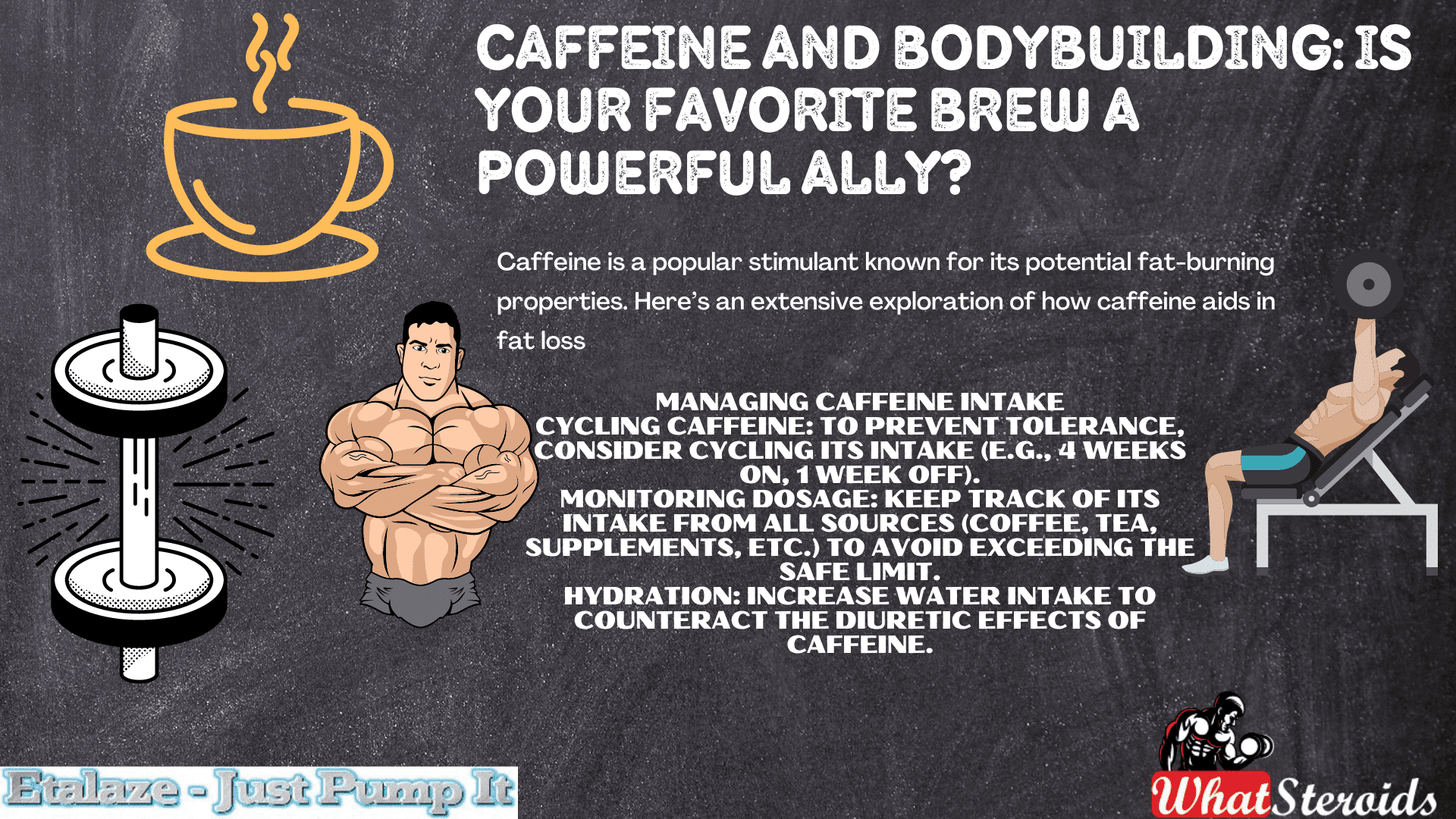
Caffeine, that beloved morning brew, may have some muscle-related benefits! A recent study in Japan found that habitual coffee drinkers had greater skeletal muscle mass. While the exact mechanism isn’t fully understood, it’s intriguing. However, caffeine’s effects on muscle protein synthesis after resistance exercise remain inconclusive. So, while your cup of joe won’t replace your dumbbells, Caffeine might give your muscles a little extra pep!
Appropriate Dosages
Pre-Workout Boost
- Timing: Take it in the morning (about 90 minutes after waking up) or right before a workout.
- Ideal Dosage: Aim for 100-200 mg, adjusted based on factors like tolerance and body weight.
- Safety Limit: Avoid exceeding 400 mg to prevent adverse effects.
During Endurance Events (3-5 hours)
- Recommended Dosage: For sustained endurance, consider ~3-6 mg/kg of body weight.
- Example: For a 70 kg (150 lb) athlete, this translates to ~200-400 mg.
Caffeine affects a bodybuilder's body in several ways, both positive and negative. Here’s a detailed look at its effects:
Must Read: Are HMB Supplements Better than Steroids? – Research Review
Positive Effects
- Enhanced Performance and Endurance:
- Increased Alertness and Focus: Caffeine stimulates the central nervous system, leading to improved mental clarity and concentration during workouts.
- Improved Muscle Strength and Power: Studies suggest that caffeine can increase the ability to generate force, enhancing performance in activities requiring strength and power.
- Increased Endurance: By mobilizing fatty acids from fat tissues and making them available for energy production, it helps sustain energy levels during prolonged activities.
- Fat Loss:
- Thermogenesis: Caffeine increases the body’s metabolic rate, leading to more calories burned at rest.
- Fat Oxidation: It promotes the use of fat as a fuel source, which can help in reducing body fat percentage.
- Reduced Perceived Effort:
- It can lower the perception of effort during workouts, making intense exercise feel less strenuous.
Negative Effects
- Dehydration:
- As a diuretic, caffeine can increase urine output, which may lead to dehydration if fluid intake is not adequately managed.
- Sleep Disturbances:
- Caffeine can interfere with sleep patterns if consumed too late in the day, leading to reduced recovery and performance in subsequent workouts.
- Increased Heart Rate and Blood Pressure:
- High doses of it can lead to increased heart rate and blood pressure, which may be risky for individuals with pre-existing cardiovascular conditions.
- Tolerance and Dependence:
- Regular use can lead to tolerance, requiring higher doses to achieve the same effects. Dependence can also develop, leading to withdrawal symptoms like headaches and fatigue if caffeine intake is suddenly reduced.
- Gastrointestinal Issues:
- Some individuals may experience stomach discomfort, acid reflux, or other gastrointestinal issues after consuming caffeine.
Specific Benefits for Bodybuilders
- Pre-Workout Motivation: Caffeine can boost mood and motivation, making it easier to stick to challenging workout routines.
- Muscle Glycogen Sparing: By utilizing fat for energy, caffeine can help spare muscle glycogen stores, allowing for prolonged performance before fatigue sets in.
- Post-Workout Recovery: Some studies suggest that caffeine can help reduce muscle soreness and speed up recovery when combined with carbohydrates.
Managing Caffeine Intake
- Cycling Caffeine: To prevent tolerance, consider cycling its intake (e.g., 4 weeks on, 1 week off).
- Monitoring Dosage: Keep track of its intake from all sources (coffee, tea, supplements, etc.) to avoid exceeding the safe limit.
- Hydration: Increase water intake to counteract the diuretic effects of caffeine.
Understanding these effects can help bodybuilders use caffeine strategically to enhance their performance and achieve their fitness goals while minimizing potential negative impacts.
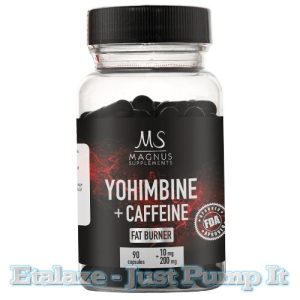 Buy Yohimbine Caffeine 90 Tabs by Magnus
Buy Yohimbine Caffeine 90 Tabs by Magnus
Caffeine Impact on Specific Chemicals
Caffeine impacts the body’s hormones, including adrenaline, cortisol, and insulin, in various ways. Here’s a detailed look at these effects:
Adrenaline
Impact:
- Stimulation: Caffeine increases the release of adrenaline (epinephrine) by stimulating the adrenal glands. This hormone is part of the body’s “fight-or-flight” response.
- Effects: The surge in adrenaline increases heart rate, blood pressure, and energy levels, preparing the body for intense physical activity. This can enhance performance in workouts, especially those requiring bursts of power and strength.
Cortisol
Impact:
- Acute Increase: Its consumption can lead to a temporary increase in cortisol levels, especially in the morning. Cortisol is a stress hormone that helps regulate metabolism, immune response, and energy production.
- Context-Dependent: The magnitude of cortisol response can depend on the individual’s habitual caffeine use, time of day, and baseline stress levels. Regular users may experience a blunted cortisol response compared to non-regular users.
- Long-Term Effects: Chronic high cortisol levels due to excessive caffeine intake can have negative effects, such as impaired immune function, increased fat deposition (particularly abdominal fat), and disrupted sleep patterns.
Also Read: Training clothing: Marvel-Inspired Clothing on Amazon in 2024
Insulin
Impact:
- Insulin Sensitivity: It can temporarily reduce insulin sensitivity, meaning that cells become less responsive to insulin. This can lead to higher blood glucose levels after carbohydrate consumption.
- Acute vs. Chronic Use: While acute intake might impair insulin sensitivity, habitual consumption does not appear to have a significant long-term impact on insulin sensitivity in most people. Some studies suggest that regular coffee consumption might even be associated with a lower risk of type 2 diabetes, possibly due to other bioactive compounds in coffee.
- Individual Variation: The effect of caffeine on insulin sensitivity can vary widely among individuals, influenced by genetic factors, the presence of metabolic conditions, and the overall diet and lifestyle.
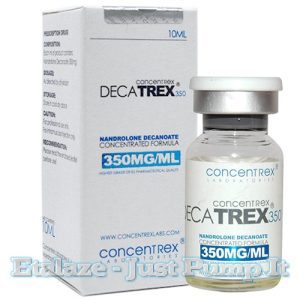 Click Here to Buy DecaTREX 350 mg/ml by Concentrex
Click Here to Buy DecaTREX 350 mg/ml by Concentrex
Fat-Burning Properties of Caffeine
Caffeine is a popular stimulant known for its potential fat-burning properties. Here’s an extensive exploration of how caffeine aids in fat loss:
Mechanisms of Fat Burning
- Thermogenesis:
- Definition: Thermogenesis is the process of heat production in the body.
- Effect of Caffeine: Caffeine increases thermogenesis by stimulating the central nervous system. This leads to a higher metabolic rate, causing the body to burn more calories at rest and during physical activity.
- Lipolysis:
- Definition: Lipolysis is the breakdown of fats into fatty acids and glycerol.
- Effect of Caffeine: It promotes lipolysis by increasing the release of adrenaline and noradrenaline, which bind to fat cell receptors and trigger the release of stored fat into the bloodstream for use as energy.
- Fat Oxidation:
- Definition: Fat oxidation is the process of burning fatty acids for energy.
- Effect of Caffeine: By mobilizing fatty acids from fat tissues, caffeine increases the availability of fats to be used as fuel, especially during aerobic exercises. This enhances the body's ability to burn fat.
- Energy Expenditure:
- Effect of Caffeine: Caffeine increases overall energy expenditure, which contributes to a greater caloric deficit and, consequently, fat loss. This effect is due to increased physical activity levels and enhanced exercise performance.
Practical Considerations for Bodybuilders
- Timing and Dosage:
- Consume it strategically to maximize performance benefits while minimizing potential hormonal disruptions.
- Avoid excessive intake to prevent chronic elevation of cortisol and significant insulin sensitivity impairment.
- Hydration and Nutrition:
- Ensure adequate hydration and balanced nutrition to support overall hormonal balance.
- Consider the timing of carbohydrate intake around workouts to manage potential blood glucose fluctuations.
- Individual Responses:
- Pay attention to individual responses to it, as effects on adrenaline, cortisol, and insulin can vary.
- Monitor for signs of excessive stress or disrupted glucose metabolism and adjust caffeine intake accordingly.
By understanding these hormonal impacts, bodybuilders can better manage their caffeine consumption to enhance performance and support overall health.
Overall
Caffeine plays a significant role in enhancing muscle mass development through several mechanisms. Firstly, it increases muscle strength and power output by stimulating the central nervous system, allowing for more intense and productive workouts. This heightened performance can lead to greater muscle fiber recruitment and overall muscle activation during resistance training. Secondly, it promotes fat loss by mobilizing fatty acids from adipose tissue, which can enhance muscle definition and visibility. By sparing muscle glycogen stores, caffeine also prolongs endurance, allowing for extended training sessions that are crucial for hypertrophy. Additionally, it has been shown to reduce perceived exertion during exercise, enabling athletes to push harder and potentially achieve greater muscle gains over time.
Lastly, caffeine may have indirect benefits by improving focus and concentration, which are crucial for maintaining proper form and technique during workouts, thereby reducing the risk of injury and ensuring consistent progress in muscle development. Overall, when used strategically, it can be a powerful ally in the pursuit of building lean muscle mass and achieving peak physical performance.
Related Article: Stacking SARMS: Different SARMS Cycles
Bodybuilding
Cellular Alchemy to Restore Testosterone Levels
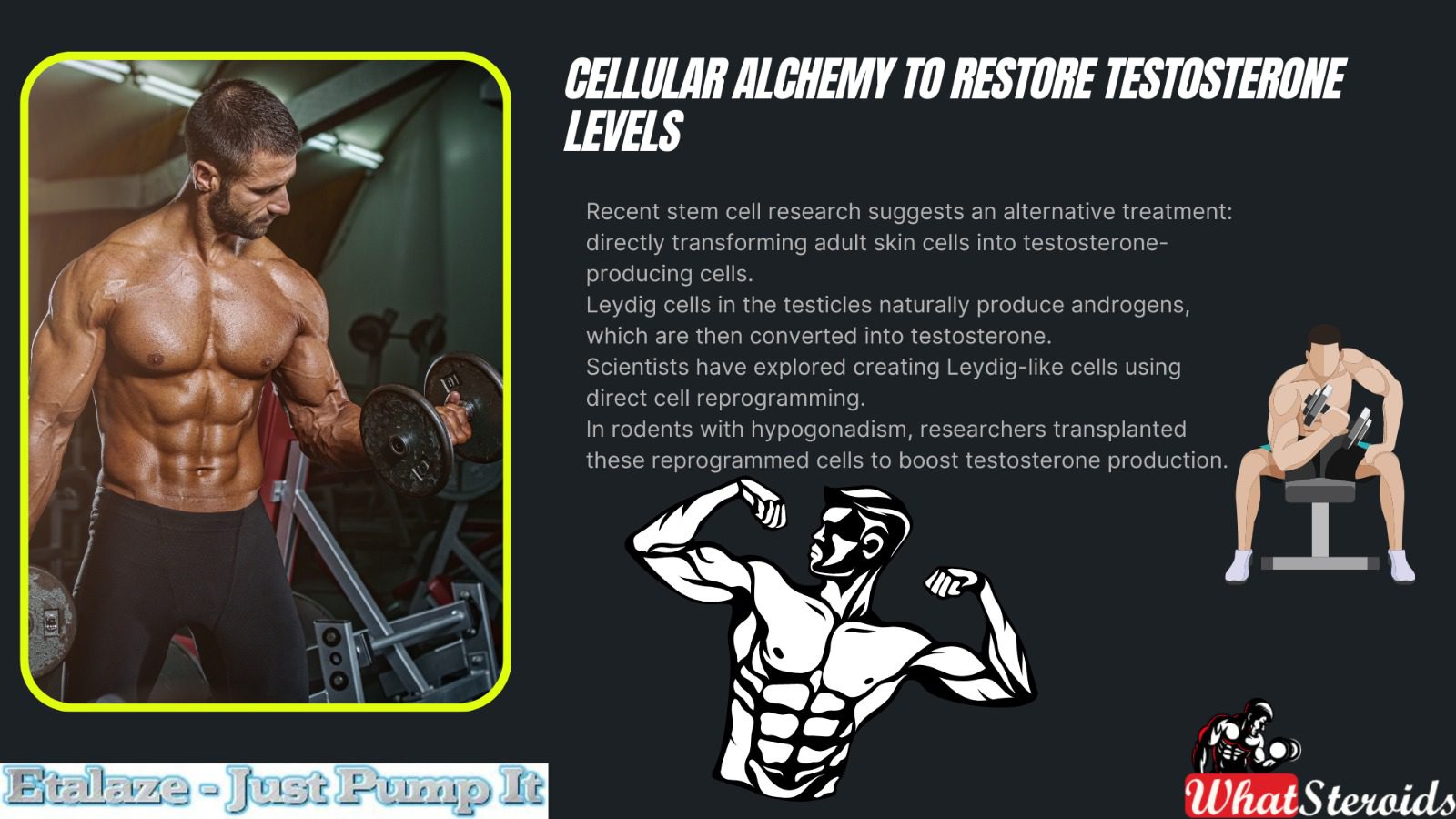
The convergence of stem cell therapy and hormone regulation represents an intriguing frontier in medical research, especially regarding the possibility of enhancing testosterone levels. In this article, we shall explore cellular Alchemy from a bodybuilding perspective.
Testosterone, the essential male hormone, plays a crucial role in various bodily functions, including muscle mass maintenance, bone density, and mood regulation. As men age, natural declines in testosterone levels can lead to hypogonadism, significantly affecting their quality of life.
Stem cell therapy or cellular Alchemy offers a promising avenue for restoring testosterone levels, even in bodybuilders. Let’s delve into the details:
Background on Testosterone and Hypogonadism
Testosterone is crucial for male sexual development, cognitive function, and overall health.
As men age, testosterone levels naturally decline, leading to conditions like hypogonadism (abnormally low testosterone).
Hypogonadism can cause mood disturbances, reduced sex drive, and weakened muscle and bone strength.
Traditional Approach: Testosterone Replacement Therapy (TRT)
The common clinical approach is testosterone replacement therapy (TRT).
However, TRT has significant side effects, including venous thromboembolism and deep vein thrombosis.
Stem Cell Research and Alternative Treatment
Recent stem cell research suggests an alternative treatment: directly transforming adult skin cells into testosterone-producing cells.
Leydig cells in the testicles naturally produce androgens, which are then converted into testosterone.
Scientists have explored creating Leydig-like cells using direct cell reprogramming.
In rodents with hypogonadism, researchers transplanted these reprogrammed cells to boost testosterone production.
Must Read: Muscle Disorders: Diagnosis, Treatment and Coping Routine
Implications for Bodybuilders
Stem cell therapy could benefit bodybuilders by:
Enhancing muscle growth: Stem cells may stimulate muscle repair and regeneration.
Improving recovery: Faster recovery after intense workouts.
Alleviating symptoms: Reduced libido, fatigue, and muscle loss associated with low testosterone.
Stem cell therapy for testosterone restoration is an exciting field, but it’s essential to understand both its potential benefits and risks. Let’s explore:
Testosterone Replacement Therapy (TRT) Risks
TRT is the common clinical approach for hypogonadism (low testosterone).
However, TRT has notable side effects, including:
Increased risk of blood clots: TRT can lead to elevated red blood cell production, potentially causing blood clots.
Sleep apnea risk: Some individuals on TRT may experience interrupted breathing during sleep.
Testicular atrophy: The testicles may shrink due to TRT.
Prostate growth: Regular prostate cancer monitoring becomes necessary.
Stem Cell Therapy Approach
Recent research explores an alternative: directly transforming adult skin cells into testosterone-producing cells.
Scientists aim to create Leydig-like cells using direct cell reprogramming.
Leydig cells in the testicles naturally produce androgens, which then convert into testosterone.
In rodent studies, researchers transplanted these reprogrammed cells to boost testosterone production2.
Implications and Caution
Stem cell therapy shows promise, but it’s still experimental.
Risks associated with stem cell therapy are not fully understood.
Safety, efficacy, and long-term effects need further investigation.
Cellular Alchemy Success Rate
Stem cell therapy for testosterone restoration shows promising results, particularly in the context of male hypogonadism. Let’s explore the success rates based on recent research:
Background on Male Hypogonadism
Male hypogonadism is characterized by abnormally low testosterone levels.
It can lead to mood disturbances, reduced sex drive, and decreased muscle and bone strength.
Approximately 30% of older men are affected by this condition.
Common Clinical Approach: Testosterone Replacement Therapy (TRT)
TRT is the standard treatment for hypogonadism.
However, TRT has significant side effects, including venous thromboembolism and deep vein thrombosis.
Stem Cell Research and Leydig-Like Cells
Scientists have explored an alternative using stem cells.
They directly transform adult skin cells into Leydig-like cells, which produce androgens and then biosynthesize testosterone.
In rodent studies, these reprogrammed Leydig cells were transplanted into testosterone-deficient animals.
Remarkably, the cells survived and restored normal testosterone levels in males with hypogonadism.
Success Rate
While individual outcomes may vary, stem cell therapy has shown promise.
Success rates are not universally defined, but the approach offers an exciting alternative to androgen replacement therapy.
Related Article: First Injectable Steroid Cycle
Holistic Approach to Men’s Health
Research Progress: As scientific knowledge advances, we recognize that health interventions should consider the whole person, not just isolated aspects.
Stem Cell Therapy: This emerging field offers potential benefits for various health conditions, including hypogonadism (low testosterone).
Holistic View: Rather than focusing solely on stem cell therapy, we should integrate it into a broader approach that considers lifestyle factors.
Lifestyle Factors and Testosterone
Diet: Proper nutrition is crucial. Certain nutrients (like zinc and vitamin D) support testosterone production.
Exercise: Regular physical activity, especially resistance training, positively influences testosterone levels.
Stress Management: Chronic stress can lower testosterone. Techniques like meditation and relaxation help maintain hormonal balance.
Complementary Role of Stem Cell Therapy
Enhancing Well-Being: Stem cell therapy complements lifestyle efforts.
Managing Hypogonadism: It can address testosterone deficiency, but it’s not a standalone solution.
Synergy: Combining stem cell therapy with lifestyle changes creates a comprehensive strategy.
Overall Health: This approach benefits not only testosterone levels but also overall health and vitality.
Viewing stem cell therapy holistically involves integrating it with lifestyle choices, creating a synergistic approach to men’s health.
Dietary Recommendations to Support Cellular Alchemy
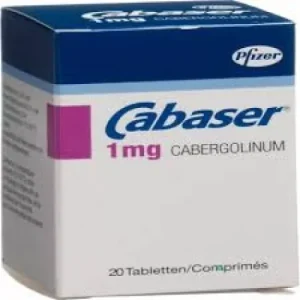 Buy Cabaser 1 mg [20 Tabs, Pfizer]
Buy Cabaser 1 mg [20 Tabs, Pfizer]
When it comes to managing hypogonadism, dietary choices play a crucial role. Here are some dietary recommendations:
Nutrient-Rich Foods
Zinc: Include foods like oysters, beef, pumpkin seeds, and legumes. Zinc supports testosterone production.
Vitamin D: Fatty fish (salmon, mackerel), fortified dairy products, and sunlight exposure help maintain healthy levels.
Healthy Fats: Avocado, nuts, and olive oil provide essential fats for hormone synthesis.
Avoid Excessive Alcohol and Sugar
Alcohol can negatively impact testosterone levels.
High sugar intake may lead to insulin resistance, affecting hormonal balance.
Protein Intake
Adequate protein supports muscle growth and overall health.
Include lean meats, eggs, and plant-based protein sources.
Anti-Inflammatory Foods
Chronic inflammation can affect testosterone.
Consume fruits, vegetables, and whole grains to reduce inflammation.
Natural Alternatives to Cellular Alchemy
If you’re looking for natural ways to boost testosterone without relying on cellular alchemy, consider the following strategies:
Ashwagandha Supplement
Ashwagandha, an adaptogenic herb, has been linked to reduced stress and increased testosterone levels.
In studies, it improved muscle strength and testosterone in men who took 600 mg daily for eight weeks.
Note that it didn’t have the same effect on women.
Prioritize Sleep
Aim for 7-9 hours of quality sleep each night.
Lack of sleep can lower testosterone levels, so prioritize rest.
Optimize Vitamin D
Vitamin D deficiency is associated with low testosterone.
Get sunlight exposure or consider supplements if needed.
Dietary Choices
Certain foods can help raise testosterone:
Grass-fed beef: Rich in nutrients and healthy fats.
Zinc-rich foods: Oysters, beef, and pumpkin seeds.
Vitamin D sources: Fatty fish and fortified dairy products.
Keep in mind that a holistic approach that combines lifestyle changes, nutrition, and natural supplements can contribute to maintaining healthy testosterone levels. Always consult a healthcare professional for personalized advice.
Overall
As a general recommendation, we advise caution regarding cellular alchemy. While it shows promise for testosterone restoration, it remains experimental. Consult a healthcare professional before considering it. For bodybuilders, natural alternatives (like lifestyle changes and supplements) are safer and more widely applicable.
Also Read: Meet the World’s Strongest Grannies
-

 Bodybuilding2 years ago
Bodybuilding2 years agoNew Arrival Workout Equipment on Amazon for The Disabled
-

 Steroids2 years ago
Steroids2 years agoSupplemental Breast Milk for Bodybuilders: The Secret Behind It
-

 Steroids2 years ago
Steroids2 years agoDwarf Bodybuilders Giving Pros A Run for Their Money
-

 Steroids1 year ago
Steroids1 year agoVOX Testing: Why Bodybuilders Must Have It Tested Regularly
-

 Steroids1 year ago
Steroids1 year agoShavers and Other Body Grooming Equipment for Bodybuilders In 2023
-

 Steroids1 year ago
Steroids1 year agoChatGPT and Other Avenues to Find Great Bodybuilding Coaches
-

 Steroids1 year ago
Steroids1 year agoBest Oil Recommendations Before Competition for Subtle Shimmer
-

 Steroids1 year ago
Steroids1 year agoPowerlifting Vs Power Building: Find Out the Big Difference and When to Shift Between the Two
-

 Beginners12 months ago
Beginners12 months agoTren Cycle for Beginners
-

 Bodybuilding11 months ago
Bodybuilding11 months agoCompetition Prep Cycle for Pro Bodybuilders
-

 Nutrition9 months ago
Nutrition9 months agoEverything Nutritional Food: What’s Too Much Or Too Little
-

 Anabolic Steroids8 months ago
Anabolic Steroids8 months agoLegality of Anabolic Steroids In Latin America
-

 Bodybuilding8 months ago
Bodybuilding8 months agoChia Seeds in A Bodybuilder’s Diet: An Expert’s Advice
-
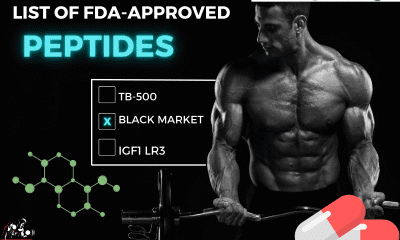
 Bodybuilding6 months ago
Bodybuilding6 months agoList of FDA-Approved Peptides
-

 Anabolic Steroids9 months ago
Anabolic Steroids9 months agoNatural Steroids for Bodybuilding
-

 Anabolic Steroids7 months ago
Anabolic Steroids7 months agoStart The New Year Strong With These Tips
-

 Beginners9 months ago
Beginners9 months agoCalisthenics: Secret to Building A Better Upper and Middle Body
-

 Bodybuilding7 months ago
Bodybuilding7 months agoUnique Things That Have Redefined Mr Olympia Over The Years
-

 Steroids5 months ago
Steroids5 months agoTrenbolone: Why it Remains A Beast In the Market
-
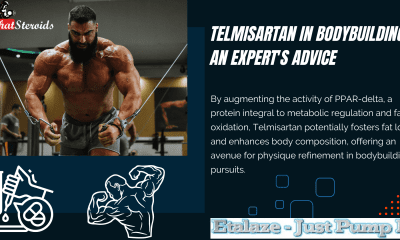
 Bodybuilding Products4 months ago
Bodybuilding Products4 months agoTelmisartan In Bodybuilding: An Expert’s Advice
-

 Bodybuilding5 months ago
Bodybuilding5 months agoThe Importance of Scaptions in Female Athletes
-

 Bodybuilding4 months ago
Bodybuilding4 months agoHow Much Is Too Much Cardio? Understanding Heart Rate Zones
-

 Bodybuilding6 months ago
Bodybuilding6 months agoFunny Gym Stories and Moments to Light Up Your Day
-

 Steroids8 months ago
Steroids8 months agoThese Bodybuilding Equipment Might Become Obsolete Next Year (See Alternative Upgrades)
-
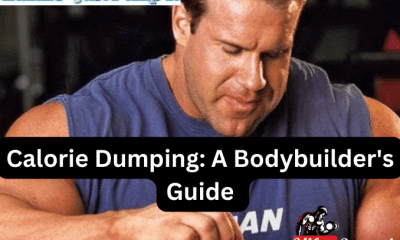
 Bodybuilding7 months ago
Bodybuilding7 months agoCalorie Dumping: A Bodybuilder’s Guide






